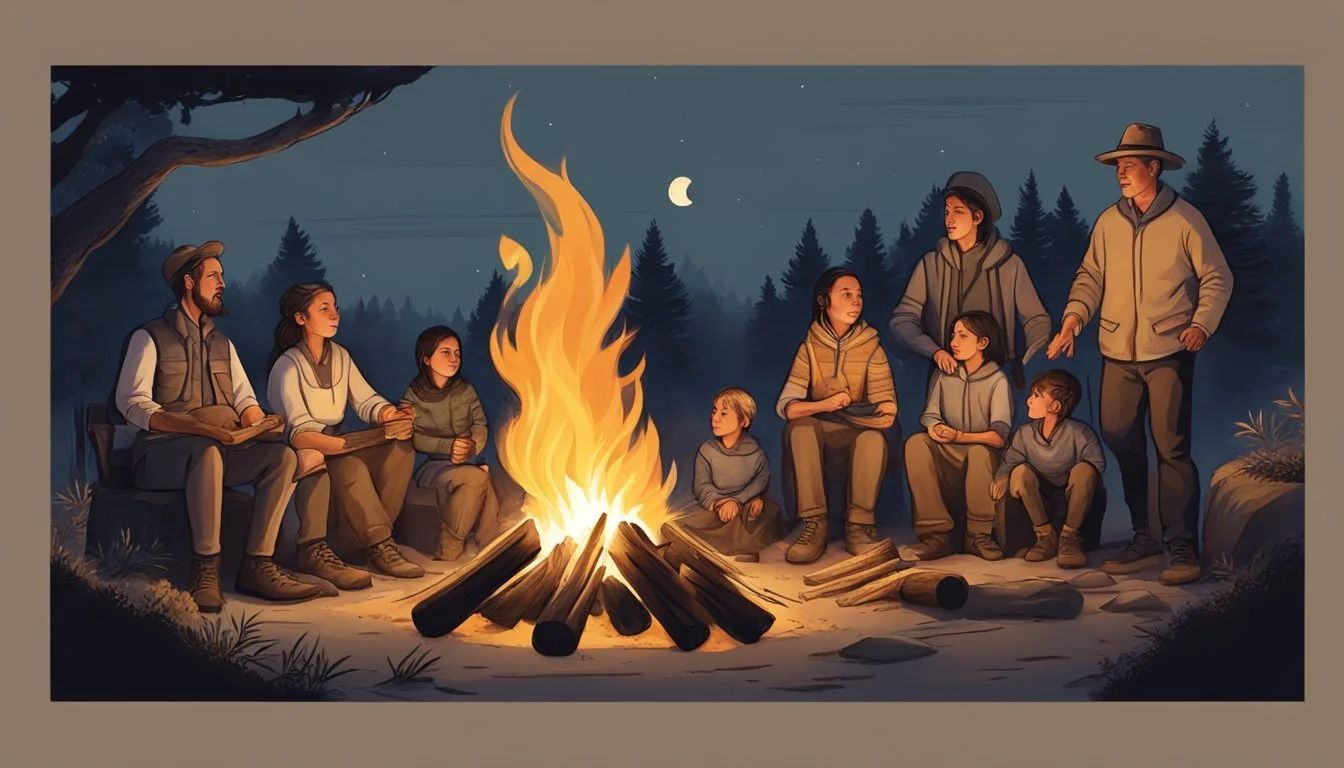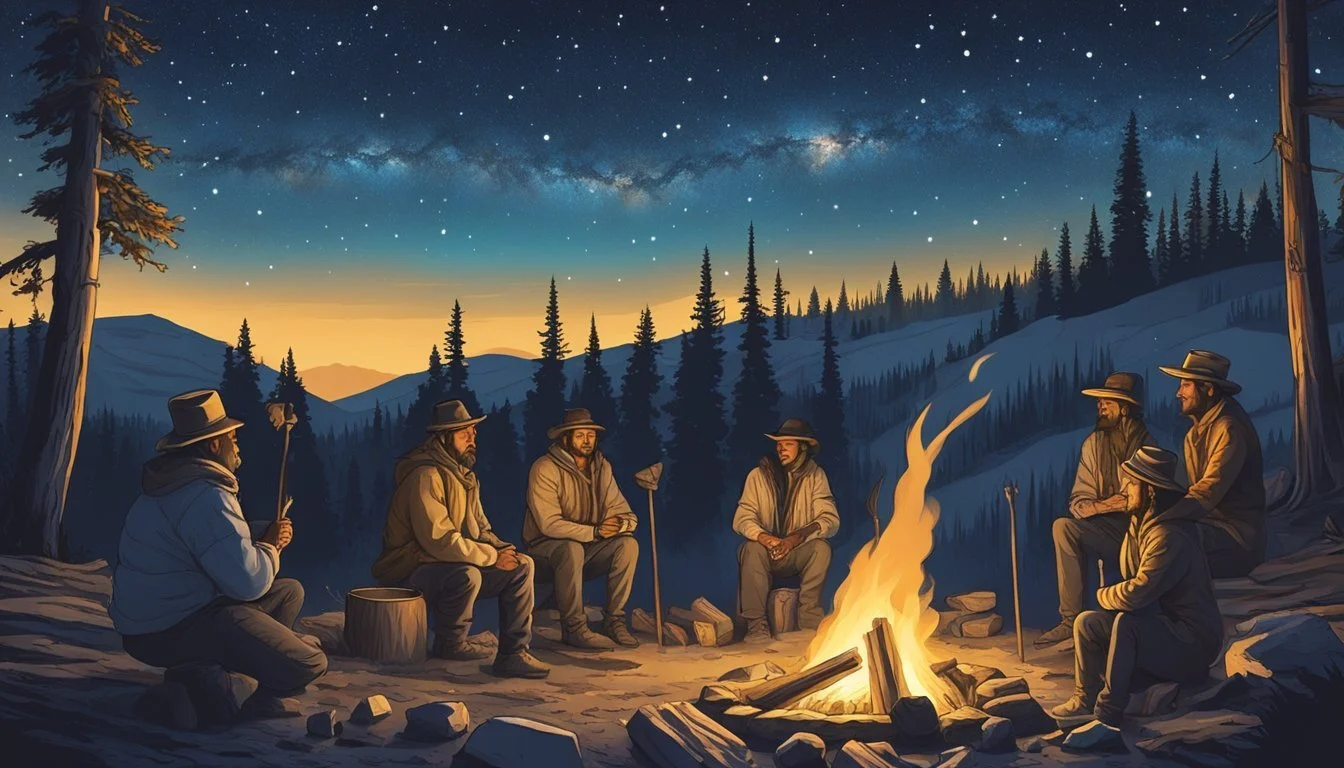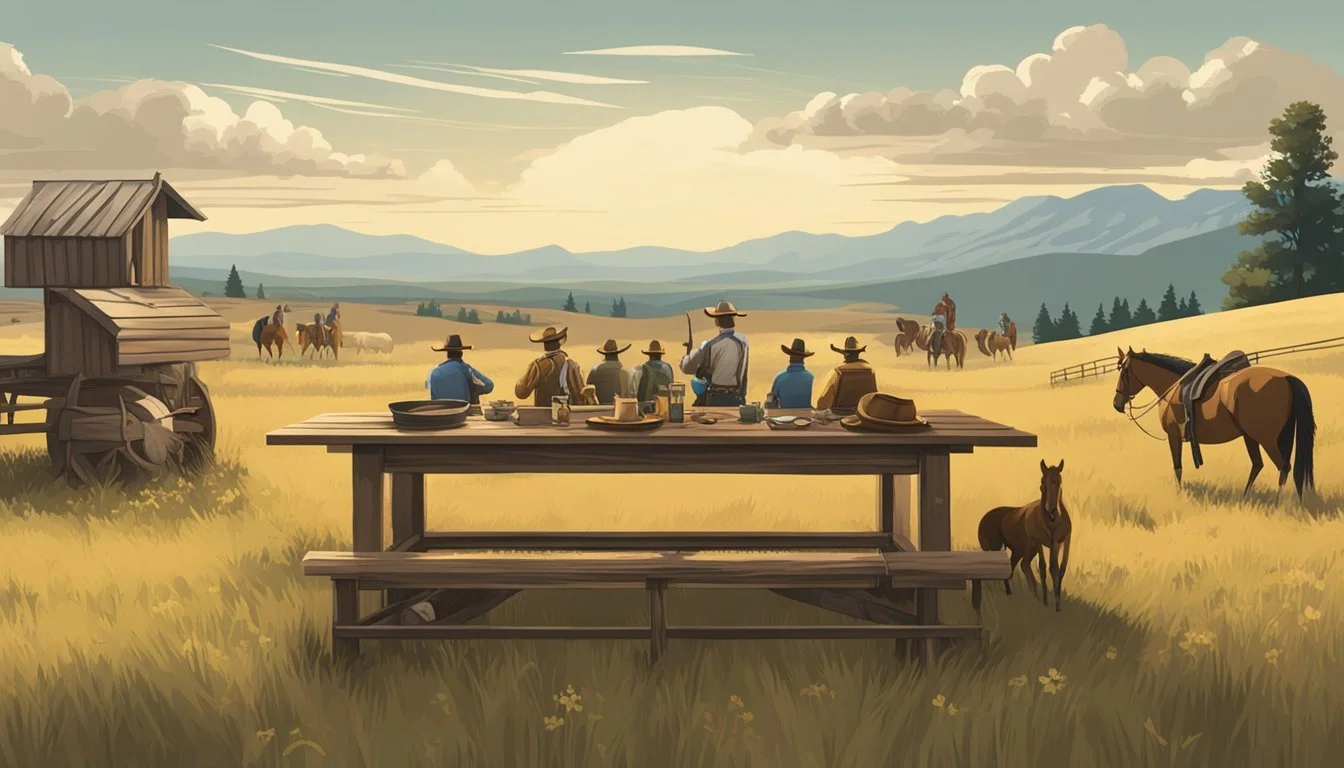Rituals and Traditions of the Dutton Family in Yellowstone
Preserving Legacy on the Ranch
The Dutton family, central to the hit series Yellowstone, upholds a rich tapestry of rituals and traditions on their sprawling Montana ranch. These practices tie them to their land and ancestors, forming the backbone of their identity. The Duttons bury their deceased family members on the ranch, a powerful custom that reinforces their deep connection to the property and their lineage.
This burial tradition, showcased in the series premiere with the interment of Lee Dutton, reflects the family's unwavering commitment to their ancestral land. It serves as a physical and symbolic reminder of the generations who have lived, worked, and died on the Yellowstone Dutton Ranch. The practice also underscores the Duttons' determination to protect their legacy at all costs.
While the series doesn't explicitly define the Duttons' religious affiliation, their traditions and values suggest a strong spiritual connection to their land and heritage. This spiritual bond, combined with their ranching lifestyle, shapes the family's rituals and decision-making processes. The Yellowstone universe, spanning multiple generations across shows like 1883 and 1923, further explores how these traditions have evolved and persisted through time.
The Founding of the Dutton Family Legacy
The Dutton family legacy began in the late 19th century with a perilous journey westward and the establishment of their iconic ranch. This pivotal period laid the groundwork for generations of Duttons to come.
James and Margaret Dutton's Journey
James and Margaret Dutton embarked on a treacherous expedition in 1883, leaving Tennessee for the promise of a new life in Montana. They faced numerous hardships along the way, including dangerous river crossings and encounters with hostile Native American tribes.
Their daughter Elsa played a crucial role in their journey, serving as a narrator for their experiences. The family's resilience was tested repeatedly, with loss and tragedy shaping their path.
Despite the challenges, the Duttons persevered, driven by James's determination to find the perfect land for their future.
Establishment of the Yellowstone Ranch
Upon reaching Montana, James Dutton discovered a breathtaking valley that would become the Yellowstone Ranch. He claimed the land through a combination of legal means and sheer force of will.
The early years of the ranch were marked by hard work and sacrifice. James and Margaret toiled tirelessly to build their homestead and establish a cattle operation.
They faced harsh winters, conflicts with neighboring ranchers, and the constant threat of losing their land. These struggles forged the Dutton family's unyielding commitment to their property.
Dutton Family Tree Beginnings
The Dutton family tree took root with James and Margaret as its founders. Their children, including Elsa and John, represented the first generation born on the ranch.
Tragically, not all of the Dutton children survived to adulthood. Those who did inherit the ranch faced their own set of challenges in maintaining the family legacy.
Each subsequent generation added new branches to the family tree, with marriages and births expanding the Dutton clan. This growth solidified their presence in the region and strengthened their claim to the land.
Key Ancestors and Descendants
The Dutton family's legacy spans multiple generations, from the pioneering James Dutton to the present-day ranch owners. Their story intertwines with the history of the American West, showcasing resilience, ambition, and a deep connection to the land.
John Dutton I and His Successors
John Dutton I, son of James and Margaret Dutton, played a crucial role in establishing the family's ranching empire. Born during the family's westward journey, he grew up on the land that would become the Yellowstone Dutton Ranch.
John I's leadership skills and determination helped solidify the Duttons' position as influential ranchers in Montana. He faced numerous challenges, including harsh winters and conflicts with neighboring landowners.
His successors continued to expand and protect the ranch, laying the groundwork for future generations.
The Legacy of John Dutton II and III
John Dutton II inherited the ranch from his father and further cemented the family's power in the region. He navigated changing economic landscapes and political climates to preserve the Dutton legacy.
John Dutton III, the current patriarch, faces modern challenges threatening the ranch's existence. His leadership style blends traditional ranching values with strategic thinking to combat external pressures.
John III's children - Lee, Beth, Jamie, and Kayce - each play unique roles in the family dynamics and ranch operations, shaping the future of the Dutton empire.
The Influence of Evelyn and Lee Dutton
Evelyn Dutton, wife of John III, played a significant role in shaping her children's characters before her untimely death. Her influence continues to impact family decisions and relationships.
Lee Dutton, the eldest son, was groomed to inherit the ranch. His dedication to the family business and strong work ethic set an example for his siblings.
Lee's death early in the series created a power vacuum, forcing his father and siblings to reevaluate their roles and responsibilities in preserving the Dutton legacy.
Cultural and Historical Backdrop
The Dutton family's story intertwines with pivotal moments in American history. Their experiences reflect broader societal shifts, from the challenges of settling the frontier to navigating economic hardships and evolving relationships with Native American tribes.
The American West and the Dutton Family
The Duttons' journey began in the late 19th century as they ventured into the untamed American West. This era of expansion and settlement shaped their identity as ranchers and landowners. The family faced harsh conditions, from unforgiving landscapes to conflicts with other settlers and indigenous peoples.
Their determination to build a legacy on Montana soil mirrored the spirit of many pioneers. As the West transformed, so did the Duttons' role in the region. They adapted to changing economic conditions, technological advancements, and shifts in land use policies.
The family's growth paralleled the development of Montana as a state. Their ranch became a symbol of the enduring impact of westward expansion on American culture and identity.
The Great Depression and World War Eras
The Great Depression of the 1930s tested the Dutton family's resilience. Like many Americans, they faced economic hardships and the struggle to maintain their land and livelihood. This period likely shaped their attitudes towards financial security and self-reliance.
As the nation moved into World War II, the Duttons, like many families, were affected by the global conflict. The year 1944 marked a significant turning point in the war, possibly impacting family members who may have served or supported the war effort.
Post-war, the family navigated the changing landscape of American agriculture and ranching. They adapted to new technologies and economic realities while holding onto traditional values and practices.
Comanche Warriors and Native American Relations
The Dutton family's history in Montana is interwoven with that of Native American tribes, including interactions with Comanche warriors. These encounters likely shaped the family's understanding of the land and its original inhabitants.
Over generations, the Duttons' relationship with Native Americans evolved. The establishment of reservations, such as the fictional Broken Rock Reservation, created complex dynamics between the family and indigenous communities.
These interactions reflected broader national issues of land rights, cultural preservation, and economic disparities. The Duttons' approach to these relationships likely shifted over time, influenced by changing societal attitudes and personal experiences.
Rituals Within the Dutton Family
The Dutton family adheres to several distinct rituals that shape their identity and maintain their legacy. These practices range from annual events to rites of passage and methods for resolving family conflicts.
Annual Events and Celebrations
The Duttons mark important dates with specific traditions. Each year, they host a grand Fourth of July celebration at the Yellowstone Ranch. This event brings together family members, ranch hands, and local community members for a day of patriotic festivities.
Thanksgiving is another significant occasion for the Duttons. The family gathers for a traditional meal, often prepared by the ranch's cook. John Dutton typically carves the turkey, a role that symbolizes his position as family patriarch.
Christmas at the ranch is a more intimate affair. The family decorates a large tree in the main house and exchanges gifts. Beth Dutton often takes charge of organizing the holiday festivities, despite her usually tough exterior.
Rites of Passage
The Dutton family places great importance on rites of passage that mark significant life transitions. For male family members, learning to ride a horse is a crucial milestone. John Dutton personally oversees this process for his children and grandchildren.
Branding day is another significant ritual. Young Duttons, like Tate, are expected to participate in cattle branding as they come of age. This practice not only serves a practical purpose but also symbolizes their integration into the family business.
Hunting trips serve as bonding experiences and tests of skill. Kayce Dutton often leads these expeditions, teaching younger family members about tracking, shooting, and respecting nature.
Handling of Family Affairs and Conflicts
The Duttons have established methods for addressing family matters and resolving disputes. Family meetings, often held in John's study, are a common practice for discussing important decisions affecting the ranch or family members.
When conflicts arise, the Duttons tend to handle matters internally. John Dutton acts as the final arbiter in most disputes, with his word carrying significant weight. Rip Wheeler, though not a blood relative, often plays a role in enforcing John's decisions.
For legal matters, Beth Dutton typically takes the lead due to her business acumen. She represents the family's interests in negotiations and helps navigate complex financial situations.
The family also maintains a tradition of loyalty above all else. This often means putting family interests before personal desires or external relationships, a practice that can lead to tensions but ultimately strengthens their unity.
Expansion and Protection of Yellowstone Ranch
The Dutton family employs various strategies to expand and safeguard their vast Yellowstone Ranch. Their methods range from strategic land acquisitions to complex relationships with neighboring properties and a deep commitment to land stewardship.
Acquisition and Maintenance Strategies
John Dutton III leads aggressive efforts to expand Yellowstone Ranch's boundaries. He leverages financial resources and political connections to purchase adjacent properties when opportunities arise. The Duttons also use legal maneuvers, orchestrated by Beth Dutton, to block development projects that threaten their borders.
To maintain the ranch's vast acreage, the family employs a sizable workforce of cowboys and ranch hands. They utilize modern ranching techniques alongside traditional methods to maximize efficiency and productivity.
Jamie Dutton's legal expertise proves valuable in navigating complex land regulations and defending the ranch's interests in court when necessary.
Relationship with Neighbors and Rivals
The Duttons maintain a delicate balance with neighboring ranches and properties. John Dutton cultivates alliances with like-minded ranchers to present a united front against external threats.
However, conflicts often arise with developers and corporations seeking to exploit Montana's natural resources. These tensions lead to power struggles and occasional violent confrontations.
Beth Dutton plays a crucial role in corporate negotiations, using her business acumen to outmaneuver rivals attempting to encroach on Yellowstone Ranch's territory.
Stewardship of the Land
The Dutton family takes pride in their role as stewards of the land. John Dutton emphasizes sustainable ranching practices to preserve the natural beauty and ecological balance of Yellowstone Ranch.
They implement rotational grazing techniques to maintain healthy grasslands and protect local wildlife habitats. The family also works with conservation groups to establish protected areas within their property.
Beth Dutton spearheads initiatives to balance economic interests with environmental preservation, recognizing the long-term value of maintaining the ranch's pristine condition for future generations.
Notable Members of the Dutton Family
The Dutton family consists of complex characters with deep ties to their Montana ranch. Key figures include patriarch John Dutton III and his children, each playing crucial roles in the family's ongoing struggles and triumphs.
Profiles of Key Family Members
John Dutton III, portrayed by Kevin Costner, leads the Dutton clan as a shrewd rancher and politician. His children form the core of the family drama:
Kayce Dutton: Former Navy SEAL, struggles between ranch life and his indigenous wife's culture
Beth Dutton: Fiercely intelligent businesswoman with a turbulent past
Jamie Dutton: Adopted son and lawyer, often at odds with the family
Lee Dutton: John's eldest son (deceased)
John Dutton IV, known as "Tate," is Kayce and Monica's son, representing the future of the Dutton legacy.
Allies and Adversaries
Rip Wheeler stands out as the Duttons' most loyal ally. Taken in by John as a teenager, he now serves as ranch foreman and Beth's partner. Monica Dutton, Kayce's wife, often finds herself caught between her Broken Rock roots and Dutton family obligations.
The Duttons face numerous adversaries, including:
Market Equities: Corporate entity seeking to develop Dutton land
Thomas Rainwater: Chairman of Broken Rock Reservation, vying for Dutton property
Malcolm Beck: Business rival who targets the family (deceased)
These relationships shape the complex dynamics of the Dutton family saga.
Media Representation and Pop Culture
The Dutton family has become a cultural icon through their portrayal in television series. Their traditions and values have captivated audiences, sparking merchandise lines and increased tourism to Montana.
The 'Yellowstone' Series Phenomenon
Yellowstone, airing on Paramount Network, has emerged as a cultural phenomenon. The show's popularity stems from its depiction of the clash between conservative rural values and liberal urban ideals.
The Dutton family embodies traditional Western culture, resonating with viewers seeking authentic representations of American heritage. This appeal has led to merchandise lines featuring iconic quotes and replicas of John Dutton's signature cowboy hat.
Yellowstone's success has also boosted tourism to Montana, as fans seek to experience the landscapes depicted in the series firsthand.
Prequel Series: '1883' and '1923'
Paramount+ expanded the Dutton saga with prequel series '1883' and '1923'. These shows delve into the family's history, offering deeper insights into their traditions and values.
'1883' stars Tim McGraw and explores the Dutton family's journey westward. It reveals the origins of certain family traditions, such as James Dutton teaching a young John to hunt.
'1923' features Harrison Ford and focuses on the Dutton family during Prohibition. This series further explores the family's resilience and connection to their land through challenging historical periods.
Casting and Character Development
The Yellowstone franchise has attracted high-profile actors, enhancing its popularity and credibility. Tim McGraw's portrayal in '1883' and Harrison Ford's role in '1923' bring star power to the Dutton legacy.
Character development across the series emphasizes the Duttons' loyalty, work ethic, and deep connection to their land. These traits resonate with viewers and contribute to the franchise's widespread appeal.
The shows also strive for authentic representation of Native American characters, although this aspect has faced some criticism and debate.






